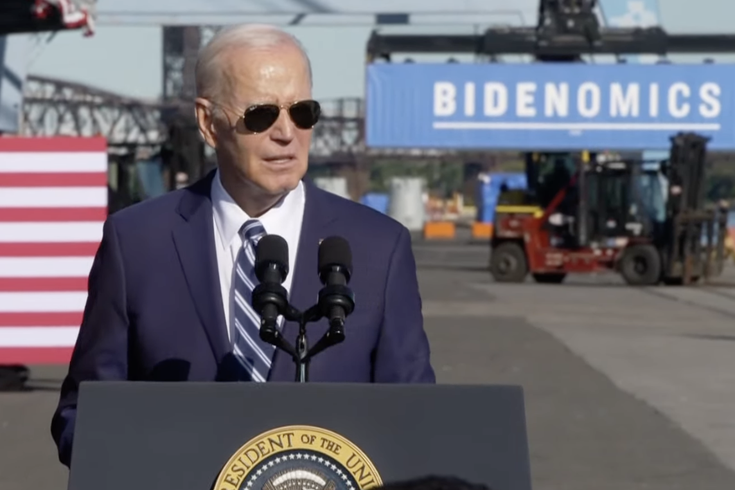
October 13, 2023
 NBC News/YouTube
NBC News/YouTube
At the Port of Philadelphia on Friday, President Joe Biden announces the Philly region will be the site of one of seven regional hydrogen hubs.
A $7 billion federal program will make the Philadelphia area one of seven regional hydrogen hubs that aim to spur development of the fossil fuel alternative, the Biden administration announced Friday.
During a speech at the Port of Philadelphia, the president touted the economic and environmental impacts of the Department of Energy's investment in cleaner-burning fuel.
"Hydrogen can power industries like the production of steel and aluminum. It's going to end up changing our transportation system — like trucks, rail, planes," Biden said. "Clean hydrogen produced using energy sources like wind and solar — that lets us get to this place without putting more carbon in the atmosphere."
The hydrogen program, part of the bipartisan infrastructure law Biden signed in 2021, will become a pillar of the administration's efforts to address climate change. Biden said the hubs will increase availability of low-cost hydrogen fuel and build job-supporting industries around a cleaner energy source.
The Philadelphia region will get $750 million to create the Mid-Atlantic Clean Hydrogen Hub, or MACH-2. The project will include new hydrogen production facilities intended to wean manufacturers, electricity generators and vehicles off of coal and oil in the years to come. The hub is expected to bring more than 20,000 jobs to the region, including 6,400 permanent jobs. The majority will be union positions.
The president cast the plan as part of his wider "Bidenomics" agenda to invest in domestic infrastructure that supports the growth of the nation's middle class.
"For the first time in a long time, we're actually investing in America. We're investing in Americans, not just America," Biden said. "We're in investing in our future."
Another hydrogen hub in the Appalachian region also will be developed in parts of southwestern Pennsylvania, Ohio and West Virginia. The other five — spread across 16 states — are planned in California, the Midwest, the Gulf Coast, the Pacific Northwest and the "heartland" states of Minnesota, North Dakota and South Dakota.
"Those hubs are about people coming together across state lines, across industries, across political parties, to build a stronger, more sustainable economy and to rebuild our communities," Biden said.
The MACH-2 hub is projected to have 17 sites spanning Southeastern Pennsylvania, New Jersey and Delaware. It will produce about 100,000 tons of hydrogen per year. It's anticipated to attract an additional $2.25 billion in private investment, Biden said.
Hydrogen fuel is often promoted as a clean path toward reducing greenhouse gas emissions in heavy industries that rely on coal and gas. These sectors of the economy — from chemical, steel and cement manufacturing to transportation and logistics — can't effectively operate using electrified power. They present dilemmas for long-term decarbonization because they require storable energy sources that are capable of producing intense heat.
Although hydrogen is the most abundant element in the universe, harnessing its power as an energy source generally requires extraction from other chemical compounds. It also necessitates extensive investments in new equipment at the facilities that will use it.
The promise of hydrogen is that it can be burned without producing CO2 emissions or stored in fuel cells that run on electricity rather than combustion.
Different types of hydrogen are color-coded based on how they're produced. Most commonly, grey hydrogen is isolated from natural gas in a process that generates CO2. This is currently the cheapest way to produce hydrogen for use as a fuel source, but it has drawbacks due to its reliance on natural gas extraction processes — like fracking — that are already energy intensive.
Green hydrogen is developed more cleanly, using electricity to separate the element from the oxygen in water. Renewable sources, like wind and solar power, can be used to make green hydrogen in a way that minimizes the input of energy. And when nuclear technology is paired with electricity, that process creates pink hydrogen.
Critics of hydrogen fuel development argue that it could be a strategic blunder, one that extends dependence on natural gas and potentially depletes other natural resources like water.
The Delaware Riverkeeper Network, an environmental nonprofit that monitors waterways in the communities along the river, opposes the Biden administration's hydrogen initiative.
"One thing we do know is it's going to be harmful to our communities, it's going to be harmful to our environment," said Maya van Rossum, the organization's executive director. "It's going to perpetuate and grow the climate crisis and it's going to be an unnecessary diversion — an inappropriate diversion — of critical financial resources from the government that should be going to growing a true clean and renewable energy economy."
Plans for MACH-2 include developing green and pink hydrogen production facilities that use renewable and nuclear electricity sources, officials said.
Between the seven planned hubs, the Biden Administration aims to have domestic capacity for 50 million metric tons of hydrogen by 2050. The White House said the hydrogen hubs will eliminate 25 million metric tons of carbon dioxide emissions from end uses each year. That's about the equivalent of combined annual emissions from more than 5.5 million gas-powered cars.
The White House aims to achieve a carbon pollution-free power sector by 2035 and a net zero emissions economy by no later than 2050.
Pennsylvania Gov. Josh Shapiro praised the Biden administration's plan and said it will be a major jolt for the state's economy.
"I have been a strong supporter of this investment in our commonwealth and my administration has worked closely with organized labor, industry partners, and our neighboring states to make Pennsylvania the only state in the country to secure two regional clean hydrogen hubs," Shapiro said.